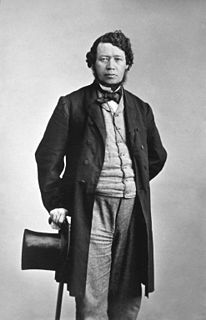A Quote by Thomas Jefferson
Instead of an aristocracy of wealth, of more harm and danger than benefit to society, to make an opening for the aristocracy of virtue and talent, which nature has wisely provided for the direction of the interests of society and scattered with equal hand through all its conditions, was deemed essential to a well-ordered republic.
Related Quotes
The natural aristocracy I consider as the most precious gift of nature for the instruction, the trusts, and government of society. And indeed it would have been inconsistent in creation to have formed man for the social state, and not to have provided virtue and wisdom enough to manage the concerns of the society. May we not even say that that form of government is the best which provides the most - for a pure selection of these natural aristoi into the offices of government?
Since nature does not endow all men with equal beauty or equal intelligence, and the faculty of volition leads men to make different choices, the egalitarians propose to abolish the "unfairness" of nature and of volition, and to establish universal equality in fact - in defiance of facts. It is not equality before the law that they seek, but inequality: the establishment of an inverted social pyramid, with a new aristocracy on top - the aristocracy of non-value.
What I used to respect was not really aristocracy, but a set of personal qualities which aristocracy then developed better than any other system . . . a set of qualities, however, whose merit lay only in a psychology of non-calculative, non-competitive disinterestedness, truthfulness, courage, and generosity fostered by good education, minimum economic stress, and assumed position, AND JUST AS ACHIEVABLE THROUGH SOCIALISM AS THROUGH ARISTOCRACY.
Where utopianism is advanced through gradualism rather than revolution, albeit steady and persistent as in democratic societies, it can deceive and disarm an unsuspecting population, which is largely content and passive. It is sold as reforming and improving the existing society's imperfections and weaknesses without imperiling its basic nature. Under these conditions, it is mostly ignored, dismissed, or tolerated by much of the citizenry and celebrated by some. Transformation is deemed innocuous, well-intentioned, and perhaps constructive but not a dangerous trespass on fundamental liberties.
[T]here are, at bottom, basically two ways to order social affairs, Coercively, through the mechanisms of the state - what we can call political society. And voluntarily, through the private interaction of individuals and associations - what we can call civil society. ... In a civil society, you make the decision. In a political society, someone else does. ... Civil society is based on reason, eloquence, and persuasion, which is to say voluntarism. Political society, on the other hand, is based on force.
The classics of Marxism talked of communism as a society to which a modern society should aspire, a society truly fair, where the relations of monetary exchange were not the priority but one wher the people's needs could be satisfied, and where people would not be worth more according to how much monetary wealth they acquired. Instead their value would be based on their contribution to society as a whole. It would be a society without class that would accept people based on their capabilities and their potential to contribute to that society.
In order to arouse sympathy, the aristocracy was obliged to lose sight, apparently, of its own interests, and to formulate its indictment against the bourgeoisie in the interest of the exploited working class alone. Thus, the aristocracy took their revenge by singing lampoons on their new masters and whispering in his ears sinister prophesies of coming catastrophe.































